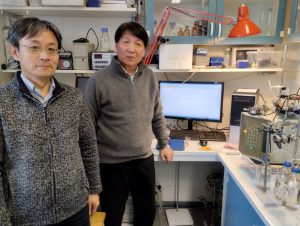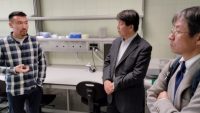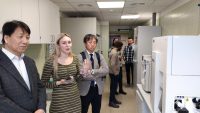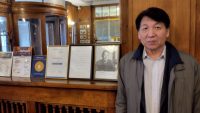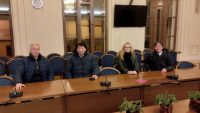Visit of Japanese scientists to Vytautas Magnus University

On 9-12 March 2023, Japanese scientists of a cooperation project carried between Lithuanian and Japanese scientists “Nanoarchitectur methodology and empirical research for fast microanalysis of environmental samples using extremely manageable π-electron materials” (funded by Research Council of Lithuania, the project coordinator on the Lithuanian side is the head of the VMU Instrumental Analysis Open Access Center, academician prof. habil. dr. Audrius Maruška) paid a visit to Vytautas Magnus university.
During the visit, Japanese scientists, prof. Hirotaka Ihara and prof. Makoto Takafuji from Kumamoto university, visited the VMU Center for Open Access to Instrumental Analysis, discussed with the scientists and researchers of the center the progress of the project, visited the center’s laboratories, and was interested in other works carried out here. They were interested in the interdisciplinary and multidirectional research work of the Open Access Center. They actively discussed the ongoing development of self-propelled remote analysis systems, the assessment of the properties of anti-cancer compounds in vitro, the research work carried out in the microbiological analysis laboratory. Colleagues from Japan submitted samples of a new generation of sorption agents for research and comparative analysis using conventional sorption agents. The course of the cooperation project, joint publications and further prospects for cooperation were discussed.
The scientists who visited VMU are the project leader on the Japanese side Prof. Hirotaka Ihara, who for a long time has been a vice-rector for international relations at Kumamoto university, headed the Okinawa College of Technology in the last term and Prof. Ihara’s successor in the field of science, one of the project coordinators Prof. Makoto Takafuji from Kumamoto university. In addition to Kumamoto university and Okinawa College of Technology from the Japanese side, the National Institute of Technology is also involved in the project. The main goal of the project, together with Japanese partners, is to develop a microanalysis system based on the latest technologies for the search for natural anti-cancer compounds from renewable sources.
Kumamoto University has over 9700 students. This university is one of the five oldest and most prestigious national universities in Japan. As an international university with a worldwide reputation for excellence in teaching and research, Kumamoto University has various departments offering a wide range of specialties and has many of the most advanced research institutes, such as the International Research Center for Medical Sciences, the International Organization for Advanced Science and Technology Research, the Institute of Impulse Energy Science, the Institute of Molecular Embryology and Genetics, the AIDS Research Center and the Magnesium Research Center. Among the notable graduates are two Prime Ministers of Japan, among them Eisaku Sato, who served as Prime Minister of Japan and received the Nobel Peace Prize, as well as Lafcadio Hearn and Soseki Natsume, both of whom are famous writers.
Guests from Japan were also invited by the Rector of VMU to visit the Rectorate and the university museum. During the visit VMU Rector reviewed the history and progress of the university after the restoration, colleagues from the Department of International Relations presented VMU cooperation with Japanese universities, active exchanges and prospects for students and teachers. The Rector agreed with guests from Japan to initiate a cooperation agreement between VMU and Kumamoto University.
During their stay guests from Japan were also invited to visit the Faculty of Natural Sciences of VMU by the Dean of the faculty prof. Saulius Mickevičius. He told about the progress of the transfer of the faculty to the university campus at the Academy, invited to visit the Environmental Science Laboratories and the Aquaculture Research Center, which is located in the same building complex. Japanese scientists were very interested in the species of fish bred here. Guests visited the “Nemunas” valley of scientific research and technology, communicated with scientists and researchers of agrosciences, microbiological research and proteomics centers, and took an active interest in their projects.
Colleagues from Japan were very interested in the Lithuanian science and studies system, Lithuanian history and current situation, and visited Trakai and Vilnius. In Vilnius, they visited the Lithuanian Academy of Sciences and the nearby Palace of the Rulers, where they got acquainted with the historical exposition and listened to a concert of Italian Baroque music. In Kaunas guests visited Žaliakalnis and Ch. Sugihara’s house.
We have been cooperating with Prof. Hirotaka Ihara for more than 26 years, we have studied and implemented new sorption materials developed by Japanese colleagues for microanalysis. This is Prof. Ihara’s second visit to Lithuania. This short and intense stay of Japanese colleagues gave the latest impressions and knowledge about the general situation and the state of science in Lithuania and will serve the further development of cooperation relations.
Academician, prof. habil. dr. Audrius Maruška

